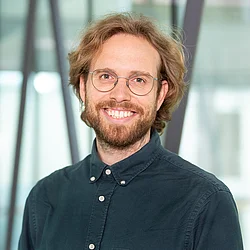Dr Jan Schlegel
Driven by the question of how life works on a molecular level, Jan Schlegel studied biology at the JMU Würzburg. Here he developed a particular fascination for biophysical methods and uncovering the hidden “nano-world”. He therefore decided to study for a doctorate in life sciences in the working group of Prof. Markus Sauer in order to further develop methods of super-resolution single-molecule microscopy for lipids in the context of host-pathogen interactions. After successfully completing his doctoral thesis (summa cum laude), he moved to the Karolinska Institutet (Prof. Erdinc Sezgin) in Sweden as a postdoctoral researcher in 2021 to develop innovative high-throughput screening methods for nanoparticles using advanced microscopy methods and synthetic biology. The award of a competitive Marie Skłodowska-Curie Postdoctoral Research Fellowship allowed him to focus on his own research in the field of asymmetric distribution of lipids in biological membranes from 2022 to 2024. He then moved to the Royal Institute of Technology (KTH) in Sweden (Prof. Hjalmar Brismar & Dr. Hans Blom) as a postdoctoral researcher, where he was able to further develop his expertise in single-molecule localization microscopy to answer cell biological questions using MINFLUX microscopy. Since August 1, 2025, Jan Schlegel has headed the HUMAN (Human Microbe Alliance for Universal Health) junior research group “Biological Codes of Pathogens” at the Helmholtz Centre for Infection Research (HZI) in Braunschweig. His group is dedicated to the research of biological codes (e.g. glycocode, biophysical code, etc.) of pathogens in order to develop innovative diagnostic and therapeutic approaches against infectious diseases.
Publications
A complete list of publications can be found here.

